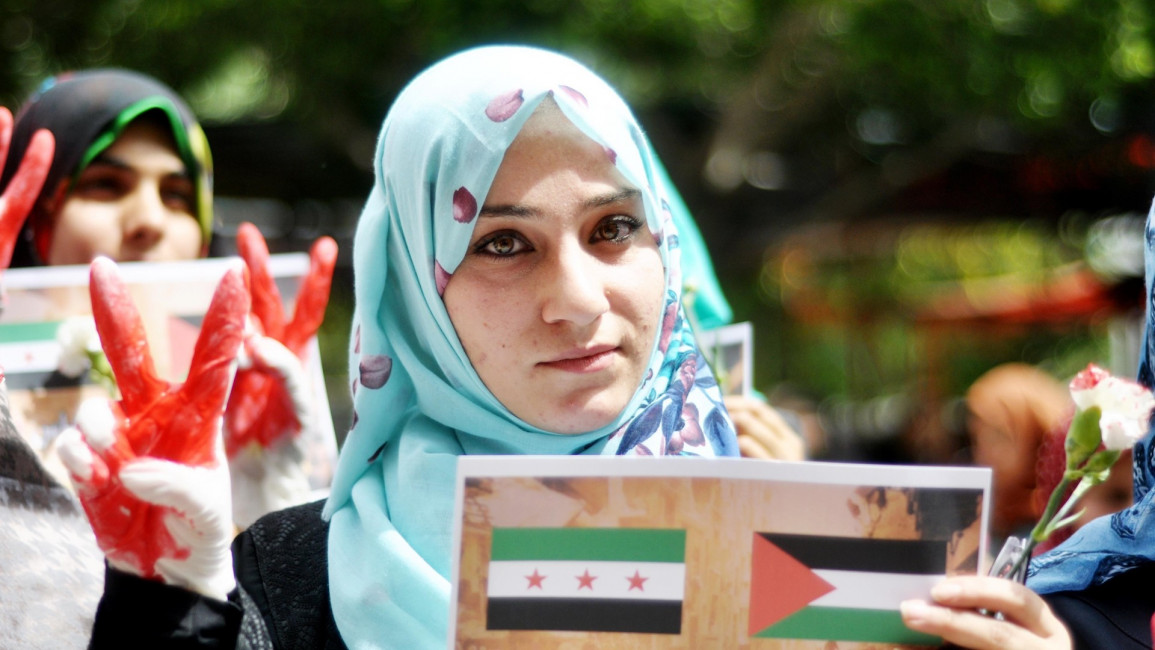Syrian regime gives thousands of Palestinian prisoners 'Israeli treatment'
As nearly 1,300 Palestinian prisoners held by Israel go on hunger strike in the occupied territories on Monday, rights groups are also highlighting the lesser known plight of thousands of Palestinian detainees held by the Syrian regime in similar conditions.
On Monday, a day commemorated as Palestinian Prisoners Day, the Action Group For Palestinians of Syria, a London-based monitoring organisation founded in 2012, called on the Syrian regime to disclose the fate of thousands of Palestinian detainees believed to be in its custody.The detentions, the group said, amount to enforced disappearances and a war crime.
In a series of press releases on its website, AGPS cited some of its previous released statistics on Palestinians forcibly disappeared and Palestinian detainees who allegedly died of torture during the Syrian conflict.
At least 1,185 Palestinians are thought to be currently detained in Syrian regime security and intelligence prisons, including 86 women, the group said, supplying a database of their names and possible times and places of arrest. Little is known about their current whereabouts or status.
In one case, the Syrian regime is thought to be holding four members of the same family, including 19-year-old Ali Daood from the Hajar al-Aswad refugee camp.
 |
The group said it has documented the deaths by execution or torture of 461 Palestinian detainees, including 59 who were idenfitied through leaked pictures of deceased torture victims, and 34 women |  |
The group said it has documented the deaths by execution or torture of 461 Palestinian detainees, including 59 who were idenfitied through leaked pictures of deceased torture victims, and 34 women. Some of the information came from testimonies made by former detainees.
|
While the vast majority of prisoners documented are held in the various detention facilities run by the Syrian government, some are detained by jihadi or rebel groups. These included, according to a 2015 investigation by the Electronic Intifada website, Bahaa Hussein from Yarmouk, detained by the former Jabhat al-Nusra in 2015 for 'blasphemy'.
In late March, another Palestinian group, the Documentation Center of Missing and Detained Palestinians in Syria, released a higher figure of detained Palestinians in Syria, which included cases that predate the current conflict by decades.
|
At the time, the group said up to 12,492 Palestinians were detained or missing in Syria by the end of March 2017, including 613 women and 789 who were children when they disappeared.
The Center said it relies on testimonies from former detainees as well as reports from families of the disappeared to collate its data.
According to former detainees, these Palestinians are given the same treatment as their fellow Syrian inmates, receiving all kinds of torture at the hands of Syrian regime jailers. Most are detained on the smallest suspicion without charge, and in many cases, their relatives who dared go to security branches to inquire about their fate were also subequently detained.
The Center also alleged that the Syrian regime has engaged in harvesting the organs of deceased Palestinian detainees, who are then buried in mass graves, incinerated or disposed of using acid.
It is difficult to independently verify the number of Palestinians detained in Syria.
The Syrian regime has refused to provide data regarding political prisoners and independent monitoring and human rights groups, including the International Committee of the Red Cross, are not granted access to the numerous prisons and detention facilities across the country.
 |
Large numbers of Palestinian refugees in Syria have since fled to nearby countries and Europe, becoming twice-displaced refugees |  |
Until March 2011, the then 500,000 Palestinian refugees in Syria made up around 2.6 percent of the population in the country. Large numbers of Palestinian refugees in Syria have since fled to nearby countries and Europe, becoming twice-displaced refugees.
The Syrian conflict began when the Baath regime, in power since 1963 and led by President Bashar al-Assad, responded with military force to peaceful protests demanding democratic reforms during the Arab Spring wave of uprisings, triggering an armed rebellion fueled by mass defections from the Syrian army.
According to independent monitors, hundreds of thousands of civilians have been killed in the war, mostly by the regime and its powerful allies, and millions have been displaced both inside and outside of Syria.
The brutal tactics pursued mainly by the regime, which have included the use of chemical weapons, sieges, mass executions and torture against civilians have led to war crimes investigations.



